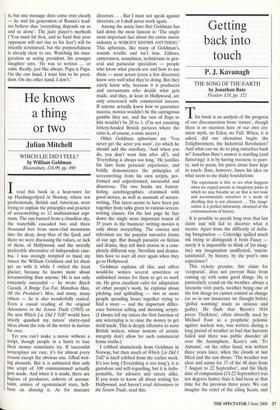He knows a thing or two
Julian Mitchell
WHICH LIE DID I TELL? by William Goldman Bloomsbury, £16.99, pp. 490 Iread this book in a heat-wave far up Hardangerfjord in Norway, where ten professionals, British and American, were trying to explain the principles and practice of screenwriting to 12 multinational aspi- rants. The sun burned from a cloudless sky, the waterfalls cascaded two and three thousand feet from snow-clad mountains into the deep, deep blue of the fjord, and there we were discussing the values, or lack of them, of Hollywood, and the morally preferable alternative of independent cine- ma. I was strongly tempted to hand my tutees the William Goldman and let them get on with it while I visited the local glacier; because he knows more about screenwriting than anyone. He is not only extremely successful — he wrote Butch Cassidy, A Bridge Too Far, Marathon Man, All the President's Men, and many, many others — he is also wonderfully cynical. Even a casual reading of the original Adventures in the Screen Trade (1983) or the new Which Lie Did I Tell? would have utterly quashed my tutees' starry-eyed ideas about the role of the writer in movies for ever.
Yet you can't make a movie without a script, though people in a hurry to lose their money sometimes try. If successful screenplays are rare, it's for almost every reason except the obvious one. G8od writ- ing abounds. But it is estimated that only one script of 100 commissioned actually gets made. And when it is made, there are legions of producers, cohorts of accoun- tants, armies of egomaniacal stars, hell- bent on abusing it. As for insecure directors . But I must not speak against directors, or I shall never work again.
Among the many laws that Goldman has laid down the most famous is: `The single most important fact about the entire movie industry is NOBODY KNOWS ANYTHING.' This aphorism, like many of Goldman's, sounds terrific and isn't true. Editors, cameramen, soundmen, technicians in gen- eral and particular specialists — people who know what pixcels are and how to use them — most actors (even a few directors) know very well what they're doing. But they rarely know why, because it is producers and accountants who decide what gets made, and they, at least in Hollywood, are only concerned with commercial success. If anyone actually knew how to guarantee success, movies wouldn't be the outrageous gamble they are, and the rate of flops to hits wouldn't be 20 to 1. (I'm not counting lottery-funded British pictures where the ratio is, of course, a state secret.) Other Goldman aphorisms are `You never get the actor you want', (to which he should add the corollary, `And when you do, you don't want him after all'), and `Everything is always too long.' He justifies his laws from personal experience, and boldly demonstrates the principles of screenwriting from his own scripts, per- formed and unperformed, successful and disastrous. The two books are button- holing autobiographies, crammed with good stories, as well as manuals of screen- writing. This latest seems to have been put together from talks given to various screen- writing classes. On the last page he lays down the single most important lesson of 35 years in the business: writing movies is only about storytelling. The cinema and television are the popular narrative forms of our age. But though parasitic on fiction and drama, they tell their stories in a com- pletely different way. Novelists and drama- tists have to start all over again when they go to Hollywood.
Goldman explains all this, and offers would-be writers several unwritten or unfinished stories for them to get to work on. He gives excellent rules for adaptation of other people's work, he explains about pitching and spitballing — two or more people spending hours together trying to find a story — and the important differ- ence between selling and shooting scripts. (I always tell my tutees the first function of any screenplay is to raise the money to get itself made. This is deeply offensive to most British writers, whose notions of artistic integrity don't allow for such commercial home truths.) I cribbed shamelessly from Goldman in Norway, but then much of Which Lie Did I Tell? is itself cribbed from the earlier work. It's too long (Everything is too long'), it is garrulous and self-regarding, but it is indis- pensable, for advisers and tutees alike. If you want to know all about writing for Hollywood, and haven't read Adventures in the Screen Trade, read this.





































































 Previous page
Previous page